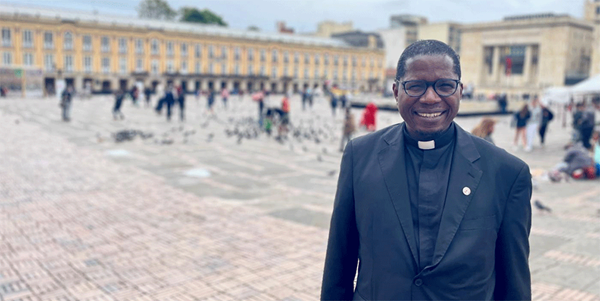The World Council of Churches is an ecumenical partner supported by the Interdenominational Cooperation Fund.
Rev. Dr Kenneth Mtata, World Council of Churches (WCC) program director for Public Witness and Diakonia, offered a keynote speech at the Christian Aid assembly in London in November.
The World Council of Churches is an ecumenical partner supported by the Interdenominational Cooperation Fund apportionment, which enables United Methodists to share a presence and a voice in the activities of several national and worldwide ecumenical organizations.
“My contribution will briefly frame some of the key challenges and opportunities that the WCC and its ecumenical partners must address to remain relevant,” began Mtata, also asking: “What are the global challenges that summon the churches witness and action?”
The world’s crises require poly-solutions, noted Mtata. “Before we look at these solutions, we need to name some of the contemporary pressing challenges,” he said. “The crisis of liberal democracy is manifested in nations disregarding international law and resorting to the use of violence as a means to achieve what they want.”
This has led to the undermining of the multilateral institutions, he said. “Closely linked to the crisis of democracy is the crisis of the free-market capitalist economy,” he said. “During times of economic shocks, the interests of the rich have been protected and during prosperity, the rich have enjoyed the profits,” he said. “The rich can evade taxation by stashing their wealth in tax havens.”
The climate and environmental crises create other related challenges, continued Mtata, who also cited the crisis of the legacies of slavery, colonialism, and other forms of power imbalances.
“Many poor countries trying to extricate themselves from the legacy of colonialism still needs to deal with challenges of a global economic system that is skewed against them in terms of trade, debt, and voice at global governance levels,” he said, then posed the question: “Why is working ecumenically so critical?”
The WCC’s work is not done in isolation, he said. “In many cases, the WCC and its partners may not themselves get involved in the implementation of local interventions,” Mtata said. “The WCC global profile could be leveraged to convene peacebuilding and mediation platforms, like we have started doing in Colombia.”
World Council of Churches website
One of seven apportioned giving opportunities of The United Methodist Church, the Interdenominational Cooperation Fund enables United Methodists to share a presence and a voice in the activities of several national and worldwide ecumenical organizations. Please encourage your leaders and congregations to support the Interdenominational Cooperation Fund apportionment at 100 percent.





